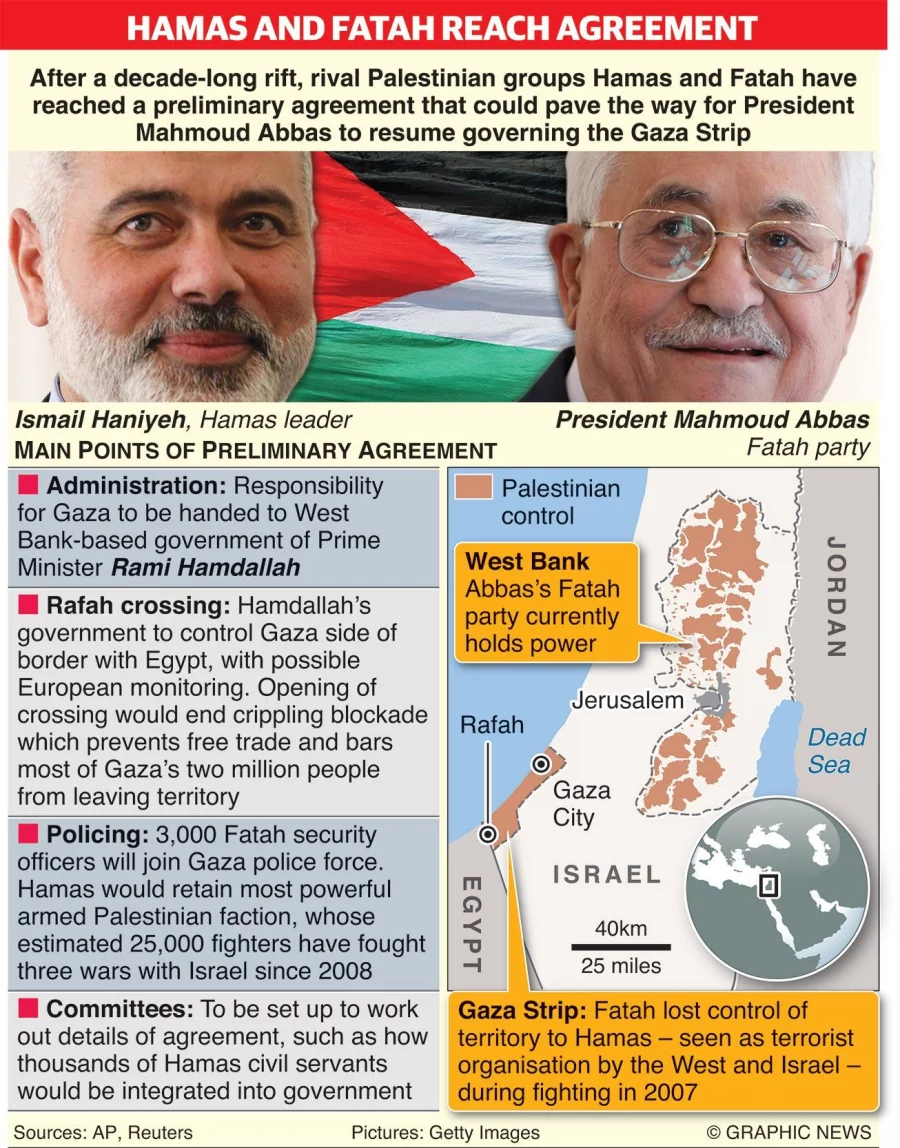The announcement of an Egypt-brokered reconciliation agreement between Fatah and Hamas on Thursday raised hopes that a decade of bitter feuding between the rival Palestinian factions may finally come to an end.
The early conclusion of the talks in Cairo hinted at how much pressure both sides were under to make progress.
Palestinian President Mahmoud Abbas hailed what he called a “declaration of the end to division”. He is expected to visit Gaza within the next month, for the first time since Hamas removed Fatah from the enclave in 2007.
However, the two sides reached only a partial agreement, addressing civil and administrative matters. Far more contentious issues - such as national elections, reform of the Palestine Liberation Organization (PLO) and the status of Hamas’ armed wing - were set aside for consideration at the next meeting in late November.
Ghassan Khatib, a former Palestinian Authority (PA) minister, said that after previous failed reconciliation efforts, the chances of success had been improved because both factions had accepted “a step-by-step approach”.
Most importantly, agreement was reached on allowing security forces under Abbas’ control to oversee the Rafah crossing between Gaza and Egypt. That should encourage Egypt to end its closure of the crossing, allowing goods and people to pass through and alleviating the enclave’s humanitarian crisis.
Egypt’s security issue
Egypt’s role has proved crucial. Mouin Rabbani, a Palestinian analyst based in Jordan, said Cairo had exploited the humanitarian crisis in Gaza as leverage to resolve its own security concerns in Sinai.
“Egypt wanted to prevent Islamic State from enjoying the benefits of a safe haven in Gaza,” he said.
In addition, Cairo feared that, if the crisis continued, it might lead to another round of fighting between Israel and Hamas, leaving Palestinians clamouring for entry into Sinai to escape the devastation. That risked shining a spotlight on Egyptian complicity with Israel in sustaining the siege of Gaza through its closure of the Rafah border crossing.

National elections
The US administration is reported to be eager to see the talks succeed too, as a way to sideline Hamas and improve the chances for President Donald Trump to sell his long-promised “ultimate” deal for peace. That is the one straw that Abbas, pursuing his diplomatic campaign for statehood, can still clutch at.
Hundreds of PA officials from the occupied West Bank arrived in Gaza last week to start setting up a national consensus government.
This administration of technocrats is intended as a temporary measure until Palestinian elections can be arranged and a representative government installed. The issue of elections is expected to be dealt with in the next round of talks.
But it is hard to see how national elections can be conducted. It was Hamas’ upset election victory 11 years ago that led to a civil war with Fatah that cemented Gaza’s effective political and territorial separation from the West Bank.
Polls indicate that Abbas or any of his likely successors would lose the presidential election to Hamas leader Ismail Haniya. In addition, Fatah would suffer in Gaza, where its vote would be weakened by support for Mohammed Dahlan, Abbas’ rival who has been exiled to the UAE. With the help of Egypt, Dahlan has been pumping Gulf money into Gaza to build his support base and challenge Abbas.
Abbas’ best hope may be that Hamas seeks to avoid the responsibility of running Gaza again and agrees not to contest the presidential election.
Hamas’ military wing
Disarmament or limitations on Hamas’ military wing would almost certainly be a deal-breaker, especially given the PA’s long-standing “security coordination” with Israel.
Hamas has spent years building a sophisticated network of tunnels under Gaza that it believes were the key to its success in withstanding the onslaught from Israel in the 2014 war. It is difficult to imagine it giving up either the tunnels or its weapons.
Hamas’ popularity also depends on its commitment, sanctioned by international law, to armed resistance. To concede control over its military wing would be to strip the movement of its very raison d’etre.
Nonetheless, there may be a path out of this apparent deadlock.
Open-air prison
Gershon Baskin, a director of the Israel-Palestine Centre for Research and Information and one of the few Israelis to have regular contact with the Hamas leadership, said Netanyahu would be on the lookout for opportunities to damage the unity government.
“For sure, he is keen to create disruptions,” he said. “He prefers that the West Bank and Gaza stay divided so that there is no pressure on him to negotiate. He can then say Abbas does not represent all Palestinians or have control over all Palestinian territory.”
For the two million Palestinians of Gaza, trapped in a tiny coastal strip that is frequently compared to an open-air prison, the Cairo deal offered a potential respite from their lives of dire shortages of electricity and lifesaving medicine, as well as a chance to travel to the outside world.
For the Palestinian leadership, it held out the prospect of negotiating with Israel with a single voice, even as it forced the divided territory’s most radical militants to make painful concessions that acknowledged their own failure to advance their cause.
Sources: The New York Times, Al Jazeera, Independent


